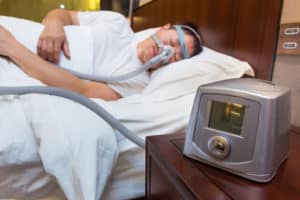TMJ and Sleep Apnea

What Is TMJ?
“TMJ” serves as a catch-all term to describe disorders of the jaw joint. It can mean constant headaches, facial pain, muscle aches in the shoulders and neck, and pain when talking and chewing. Your jaw may make a clicking or popping sound when you open and close it, and it may even lock up. TMJ can be the result of years of tooth grinding (also known as “bruxism”), trauma or injury to the jaw, or a misaligned bite.
Studies have shown that 43% of patients with TMJ also have difficulty sleeping. In the worst-case scenario, this can be sleep apnea, a disorder where the patient stops breathing briefly throughout the night. Your body wakes you up each time this happens to get you to resume breathing – you probably don’t even realize this is happening, and you may wonder why you are so tired all the time. Besides being exhausted during the day, you might also often have headaches, a dry mouth, a sore throat, and difficulty concentrating. In the long term, sleep apnea can cause serious medical problems. And, when you don’t get enough sleep, it can make your TMJ symptoms even worse.
The good news is that there may be one solution for both TMJ pain and sleep apnea. Oral appliance therapy involves a simple device that you wear over your teeth at night to prevent the soft tissues at the back of the throat from collapsing as you sleep, to make sure that you get enough air. Use of this device might alleviate some of your TMJ symptoms as well, by helping to move the jaw into the proper position and helping you to get better sleep.
Do you think you might have sleep apnea and TMJ? Contact eos dental sleep for more information about how oral appliance therapy may be able to help you. Call the office in Philadelphia at (215) 241-0700 today!
